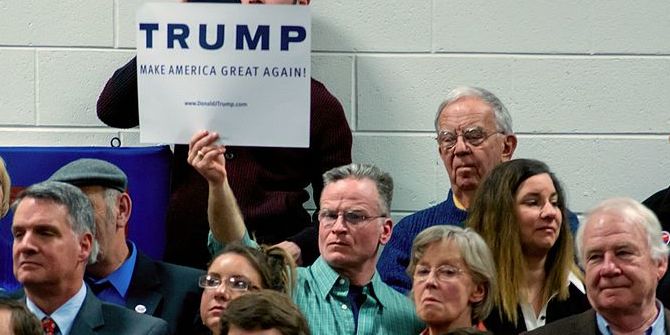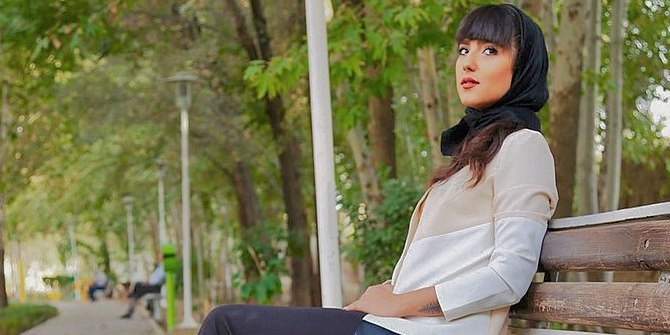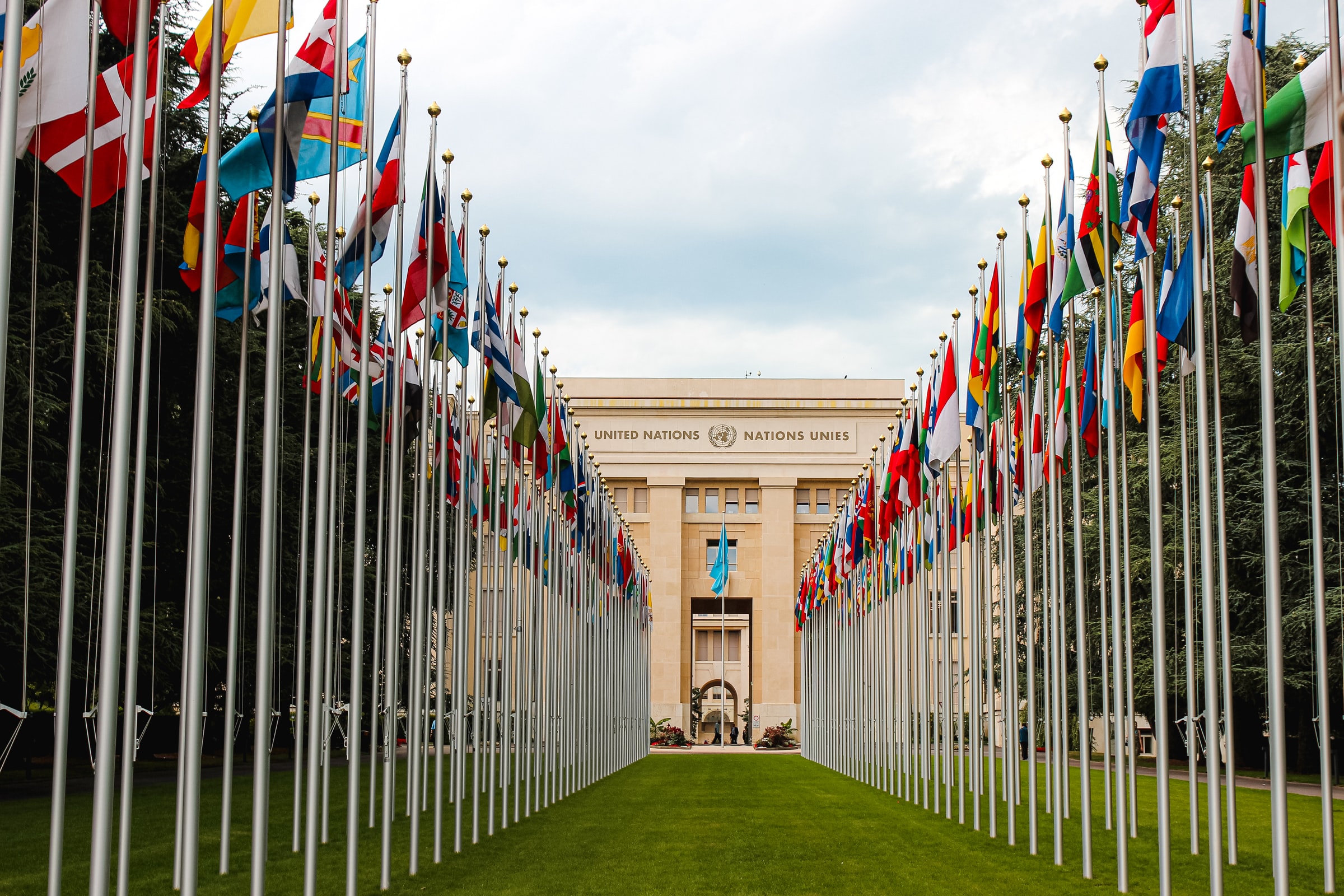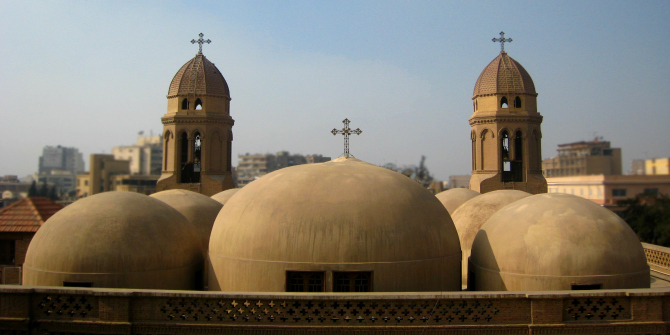In the first Populism and Religion article, Nadia Marzouki and Duncan McDonnell explain how populists portray elites and minorities, particularly Muslims, as an existential threat to the majority’s way of life. This discourse is increasingly common in public debate, with right-wing populists and centre-right conservatives across the West competing to present themselves as the defenders of an embattled Christian civilisation.

“I think Islam hates us. There’s a tremendous hatred there. There’s an unbelievable hatred of us”. So said presidential candidate Donald Trump in a March 2016 interview.
“Us” and “Them”. Right-wing populists like Trump base their appeals on these antagonistic pillars. There is “the good people”. And, aligned against them, there are the corrupt elites and dangerous “others”.
Who and what “us” and “them” are depends on the populist, but, in the Trump worldview, a (previously) silent majority of virtuous, hard-working, Christian folk is said to be under threat from the Washington establishment, the liberal media, foreigners and Muslims.
The latter in particular have come in for targeting by Trump, both during his campaign and since taking office. One of his first acts as President was to sign an order blocking citizens from seven Muslim-majority countries from entering the United States. Rudy Giuliani told the media that Trump had referred to it as a “Muslim ban”.
There is nothing new about right-wing populists exploiting religion for political gain. As our book with Olivier Roy, Saving the People? How Populists Hijack Religion, discusses, European parties like the League in Italy and the Austrian Freedom Party were using religion to define who “the people” is, and who it is not, long before Donald Trump did so.
Internationally, the leading evangelist of this right-wing populist gospel is the Netherlands’ Geert Wilders who has travelled the West warning those of Christian heritage that they are in danger. For example, in 2011, he told an audience gathered in a Tennessee church: “Wake up Christians of America. Islam is at your gate”.
At the same time as proclaiming potential doom, however, right-wing populists offer their followers exculpation. They tell them that the country’s problems are not their fault. Rather, the people are morally upright citizens who are victims of the elites and all those “others” who do not look like they do, sound like they do, or believe the same things they do.
In the populist vision of society, the elites and “others” feed off one another. The secular, minority-loving elites disregard the importance of the people’s religious heritage. And the “others” exploit elite weakness to impose their religious values and laws upon the native population.
The redemptive journey proposed by right-wing populists thus requires repelling the many assaults on the people’s identities and traditions. Ranging from supposed bans on nativity plays to the imposition of Halal food on unsuspecting Christians, these attacks are said to form part of a surreptitious “Islamization” plan. And, if we do not act now, so the message goes, sooner or later we will be living under Sharia Law.
Linked to the “Islamization” plot is another contention that has featured regularly in right-wing populist appeals: that Islam is not in fact a religion (as “we, the people” know it). Rather, it is a political ideology that aims to conquer and suppress Western liberal democracies. The populist saviours of the people stand alone in democracy’s defence.
This definition of Islam as a non-religion also serves as a rhetorical strategy allowing populists to deny the legitimacy of Muslim claims to religious freedom, and more generally, the rights of Muslims living in Western countries. After all, how can Muslims claim a legal right to practice their religion when what they are practicing is not actually a religion?
If we accept this view of Islam, then every Muslim becomes a potential threat, since they are all said to adhere to an undemocratic and violent political ideology. The “moderate Muslim”, in this narrative, does not – and cannot – exist.
Muslims are thus the perfect “dangerous other” for the right-wing populist. As Trump has said, all of them should be stopped from entering the country because any of them could be a threat.
While extreme, some of these right-wing populist arguments have become common in public debates, with a vicious circle now established in many countries between right-wing populist and Conservative/centre-right discourses, whereby one enables and feeds off the other.
In Australia, for example, the Liberal Party Social Services minister – and now prime minister – Scott Morrison said in 2015 that the country should take Christian refugees from Syria rather than Muslim ones. The Australian right-wing populist leader Pauline Hanson has since taken things further, referring to Islam as a “disease” and calling for a Muslim ban.
We are therefore faced with the increasing exploitation of religion in political discourse by both mainstream politicians and right-wing populists to express belonging rather than believing. To defend the territory of Christendom rather than the values of Christianity.
While the populist instrumentalization of religion has become a hegemonic framework of the political moment, movements and leaders such as the New Sanctuary Movement or the Poor People Campaign led by Reverend William Barber have emerged in the past years to challenge this.
Trying to build ecumenical alliances among faith-based and secular organizations, these push forward an alternative narrative in which religious values provide a rationale for progressive agendas on issues such as refugees, health care and the environment.
Or, to put it another away, they are among the few seeking to wrest back some control from the self-proclaimed “saviours of the people” who have hijacked religion.
Note: This piece gives the views of the author, and not the position of the LSE Religion and Global Society blog, nor of the London School of Economics.






Very good article.
I know this series is focusing on the use of religion by populists in the West. I would love to see it expanded to cover other areas too – how is religion being used by populists in the Middle East, the Indian Sub-continent and so on?